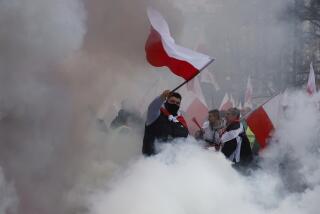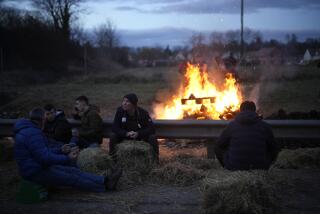Fueled by Fiscal Hardship, Ukraine Miners Strike Spreads
- Share via
KIEV, Ukraine — This nation’s biggest labor protest of the post-Soviet era spread Friday as workers from at least half the 250 coal mines were reported on strike demanding better wages and a change in the country’s leadership.
More than 150,000 miners have walked out in protest against fourfold price increases that were imposed last weekend on everything from groceries to gasoline in order to stabilize the falling value of Ukraine’s currency.
The strike, launched Tuesday in the eastern industrial Donbass region and now spreading to other parts of the country, is the most serious challenge to Ukraine’s free-market reform program, which mirrors that being attempted in Russia and other former Soviet republics.
Driven by economic hardship but directed at politicians, the walkout has put new pressure on President Leonid Kravchuk as he and Prime Minister Leonid Kuchma argue with each other--and with the more conservative Parliament--over who should govern this country of 52 million.
The strike is being led by the same miners whose agitation over soap and food shortages shook the Soviet regime of Mikhail S. Gorbachev in 1989 and evolved two years later into labor demands for Ukrainian independence that helped break up the Soviet Union 18 months ago.
Since then, the miners have watched in frustration as their heroic status and their paychecks have shrunk and are turning on the leaders they helped bring to power.
In a televised address Thursday night, Kravchuk condemned the walkout as “a struggle for power against the authorities” and rejected the demands for higher pay.
But on Friday, he named Efim Zvyagilski, a former miner and now mayor of the strikebound mining city of Donetsk, as first deputy prime minister in his government--a move aimed at reaching a compromise.
At stake are not only miners’ wages but also the stability of the young Ukrainian state. Many here worry that continued economic decline could prompt Russified areas of eastern Ukraine, which produces the country’s only domestic source of fuel, to ignore the wishes of Kiev and turn to Russia for solutions.
The miners, whose Dickensian working conditions produce mortality rates many times higher than in Western coal mines, are demanding an end to salary delays, a rise in minimum wages and indexation of their bank deposits. Their district legislative councils, which support them, want economic autonomy and closer ties with Russia.
Strike leaders are also demanding a national vote of confidence in Kravchuk and election of a new Parliament by year’s end. They have called for a general strike starting Monday.
“We will have the people on our side because the price rises have touched everybody. Hunger and poverty will force people onto the streets,” said strike leader Vyacheslav Kuzmin.
In his speech, Kravchuk agreed in principle to the strikers’ demand for new elections, but not “in conditions of chaos.” In an interview, Parliament Chairman Ivan Plyushch said he too supported calls for a new political start for the country.
The severity of the economic crisis has caught up with Ukraine’s leaders, who have ignored their own plans for economic reform to the point where some regions, especially Crimea, are threatening to break ties with Kiev.
The strike is just one consequence of economic mismanagement. Another is the mutiny by sailors in the Black Sea Fleet, who are demanding payment in Russian rubles because Ukraine’s currency, the karbovanets, has proven to be weaker.
The karbovanets plunged to a new low against the dollar this week, falling from 3,300 to 4,000 in one day.
Miners are among the best paid manual workers in Ukraine, earning up to $45 a month. But groceries for one person can cost at least $7.50 per week. One kilogram (2.2 pounds) of pork costs more than $1. “The wages are not enough to feed a family,” said Igor Panarin, shift manager at a Donbass coal mine.
More to Read
Sign up for Essential California
The most important California stories and recommendations in your inbox every morning.
You may occasionally receive promotional content from the Los Angeles Times.










